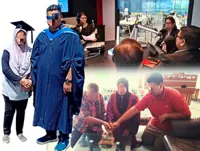HE was a top student.
Upon completing secondary school, he was received by an institute of higher learning to embark on foundation in law. His parents, a fisherman and a food stall vendor from a small coastal village in Malaysia, were proud of and had high hopes for their bright son. With the good grades he consistently churned out, his future seemed sealed.





